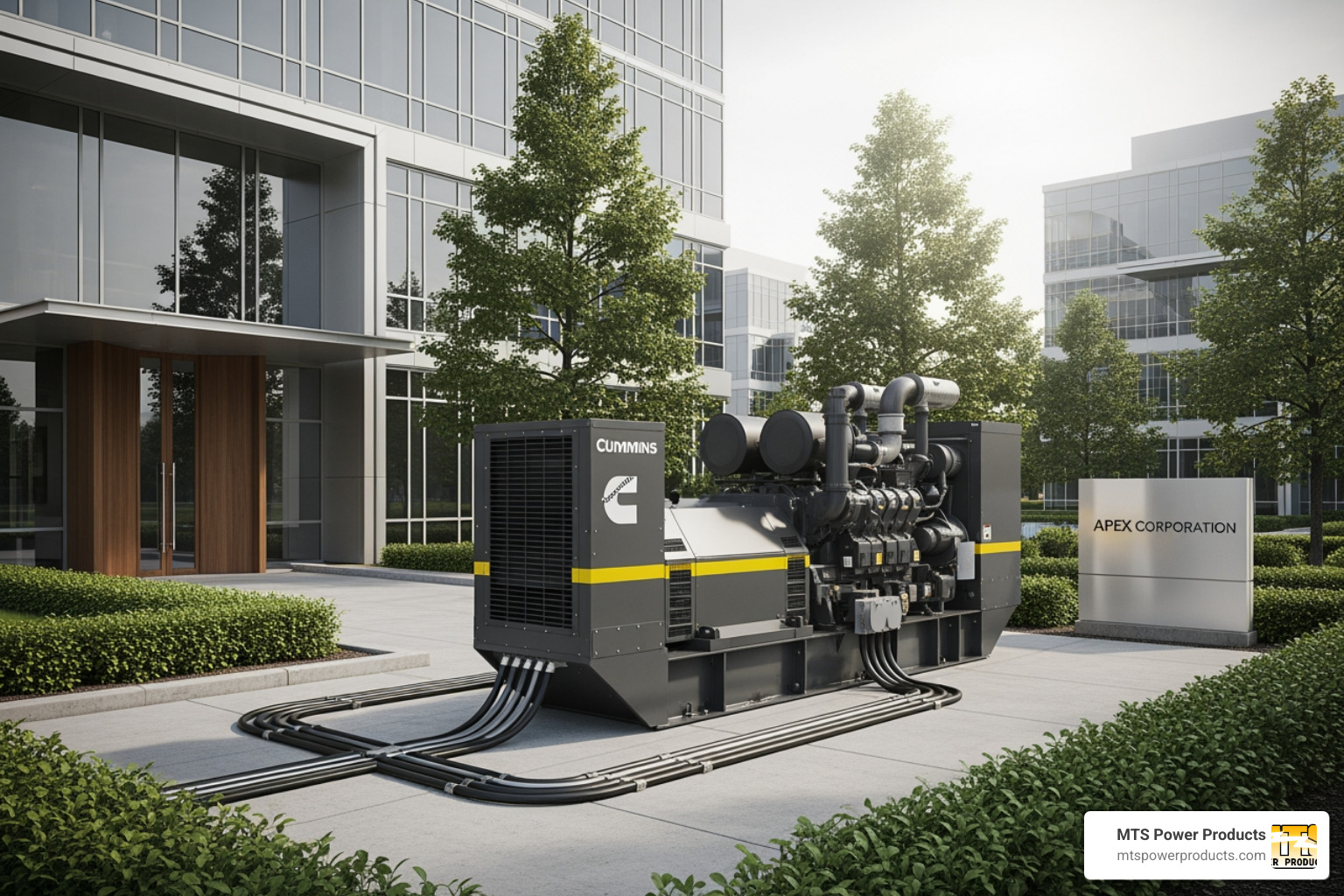
Buy Direct
from the Manufacturer
Sell our Products
Become a Distributor
Discounts
on volume purchases
Visit Us
at our Miami office
from the Manufacturer
Become a Distributor
on volume purchases
at our Miami office
The natural gas generator cost ranges from $3,000 to $26,000 depending on size and installation complexity. Here’s what you need to know:
Quick Cost Breakdown:
Power outages don’t wait for convenient timing. Whether you’re managing a manufacturing facility that can’t afford downtime or protecting your family during hurricane season, understanding the true cost of backup power is crucial for making smart investment decisions.
The sticker price on a natural gas generator tells only part of the story. Like buying a car, the real cost includes installation, fuel consumption, and ongoing maintenance over 20-30 years of service life.
Recent market data shows natural gas generators have gained significant ground, jumping from 28% market share in 2013 to 38% in 2016. This shift happens because natural gas offers lower fuel costs, unlimited supply through existing pipelines, and cleaner operation compared to diesel or gasoline alternatives.
But here’s what most buyers miss: a $5,000 generator can easily become a $15,000 investment once you factor in professional installation, transfer switches, permits, and gas line connections. The good news? Natural gas typically costs 3-4 times less per BTU than diesel fuel, making it the most economical choice for long-term operation.
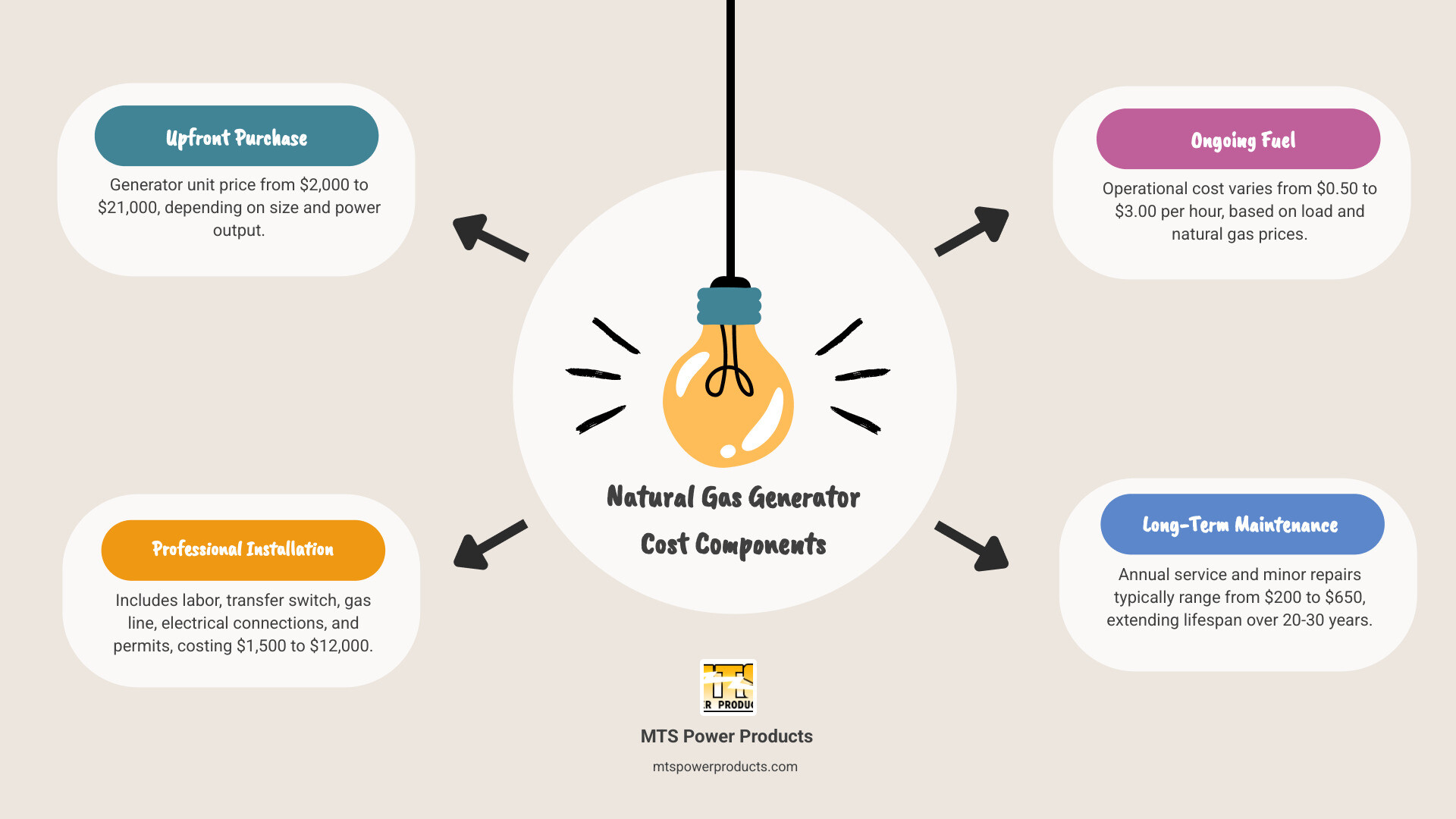
Natural gas generator cost terms made easy:
Shopping for a natural gas generator feels a lot like buying a car – there’s a model for every need and budget. The natural gas generator cost for the unit itself typically ranges from $2,000 to $21,000, but understanding what drives these price differences will help you make the smartest choice for your situation.
The beauty of natural gas generators lies in their competitive pricing. For smaller units under 150 kW, you’ll often find natural gas models priced at or even below comparable diesel generators. However, once you venture into the larger commercial territory above 150 kW, natural gas units can cost 60% to 100% more due to their more sophisticated engine designs and specialized components.
Here’s something that surprises many first-time buyers: unlike portable gas or diesel generators you might grab at a hardware store, natural gas generators are almost exclusively standby generators designed for permanent installation. This means you’re investing in a professional-grade solution that connects directly to your home’s gas line and electrical system.
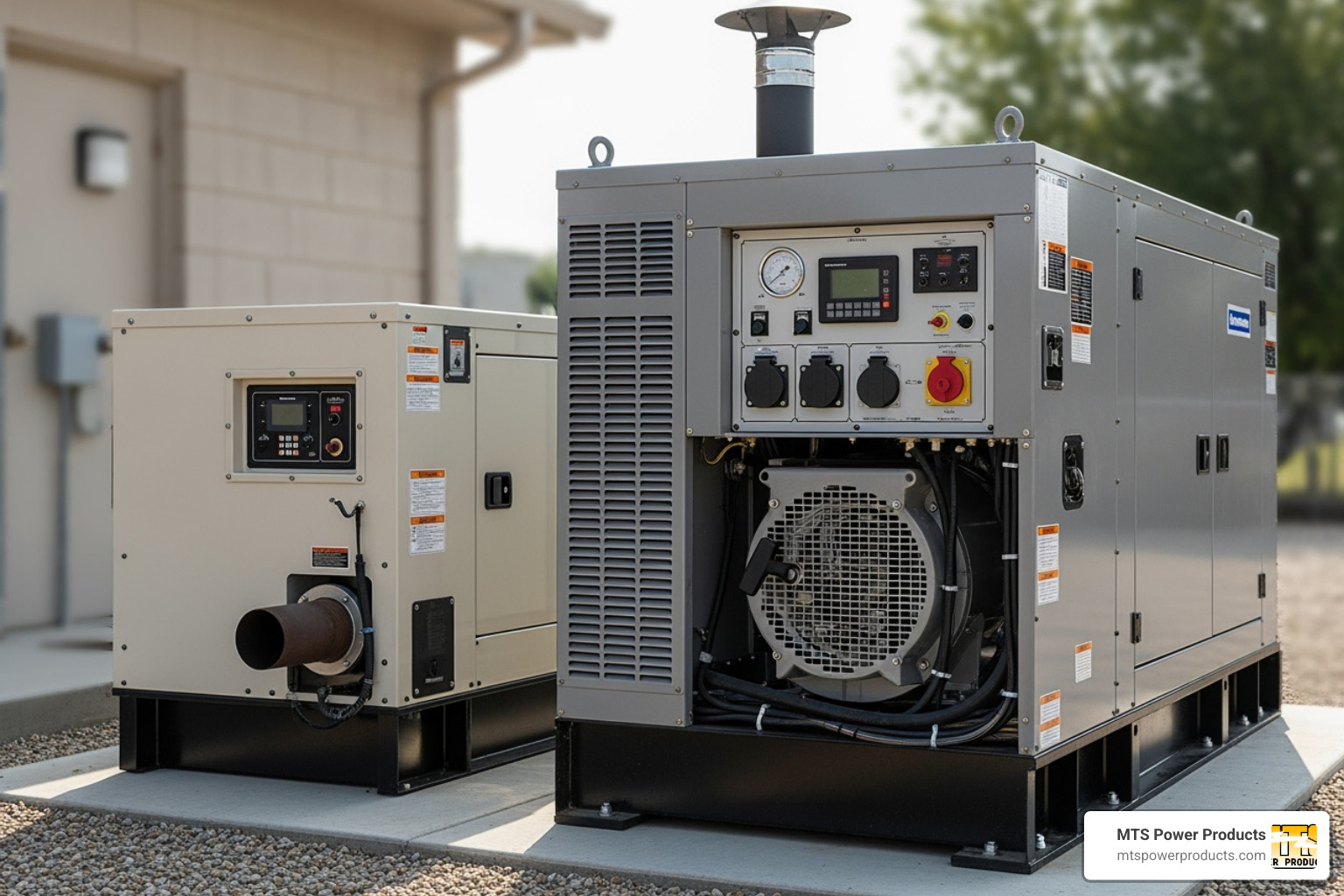
Think of generator sizing like choosing the right air conditioner – too small and you won’t have enough power when you need it, too large and you’re paying for capacity you’ll never use. The cost per kilowatt becomes your best friend when comparing options.
Smaller generators (7-10 kW) priced between $2,000 and $4,000 handle your essentials beautifully. We’re talking about keeping your refrigerator running, a few lights on, and maybe your internet router powered up during an outage. Perfect for apartments or smaller homes where you just need the basics covered.
Medium-sized units (14-20 kW) in the $4,000 to $5,800 range represent the sweet spot for most homeowners. These whole-house generators can run your HVAC system, water heater, and most appliances without breaking a sweat. It’s like having a reliable backup plan that doesn’t require you to choose between comfort and convenience.
Larger residential generators (20-24 kW) costing $5,600 to $13,500 are for those who want it all. Central air conditioning, electric dryers, pool pumps – these units handle everything your home throws at them. They’re particularly popular in areas where extended outages are common.
Commercial-grade units (22-48 kW and beyond) start around $12,300 and can reach $25,000 or more. These powerhouses serve large homes, small businesses, or any application where continuous power is non-negotiable.
The key is matching your actual electrical load to the generator size. A professional load calculation prevents you from overspending on unnecessary capacity. For insights into residential applications, check out Reasons to Consider a Home Natural Gas Generator.
The difference between home standby units and continuous power generators goes far beyond just size – it’s about how they’re built to work.
Residential generators are the reliable family car of the power world. They’re designed for intermittent use during outages, prioritizing quiet operation and seamless integration with your home’s electrical system. These units feature automatic transfer switch compatibility and are engineered to start automatically when the power goes out, then shut down gracefully when utility power returns.
Commercial grade generators are more like work trucks – built for heavy-duty, extended operation. They often run continuously or for very long periods, featuring more robust monitoring systems, advanced parallel capabilities, and components designed to withstand demanding industrial environments. While a residential 20 kW unit might cost $8,000, a commercial-grade unit with similar output could cost significantly more due to these improved durability features.
Here’s an interesting reality: you won’t find cheap, portable natural gas generators at your local big box store. These units require permanent gas line connections, making them a more substantial investment from day one. But this “limitation” is actually a strength – you get unlimited fuel supply without ever worrying about refilling tanks or running out of gas during extended outages.
For those considering smaller installations, our guide on Small Natural Gas Generator: Economical and Eco-Friendly options provides valuable insights into maximizing value while minimizing environmental impact.
Here’s where many homeowners get their first real surprise: buying the generator is just the beginning. The natural gas generator cost for installation typically adds another $1,500 to $12,000 to your total investment, and this isn’t something you can tackle over a weekend with your toolbox.
Professional installation isn’t just recommended—it’s absolutely essential. We’re talking about connecting high-pressure gas lines and integrating with your home’s electrical system. One mistake could lead to gas leaks, carbon monoxide poisoning, or electrical fires. Plus, most local codes require professional installation anyway.
The good news? A properly installed system will serve you reliably for decades. The average installation runs between $4,000 to $5,000 for most home standby generators, though complex setups can push costs higher.
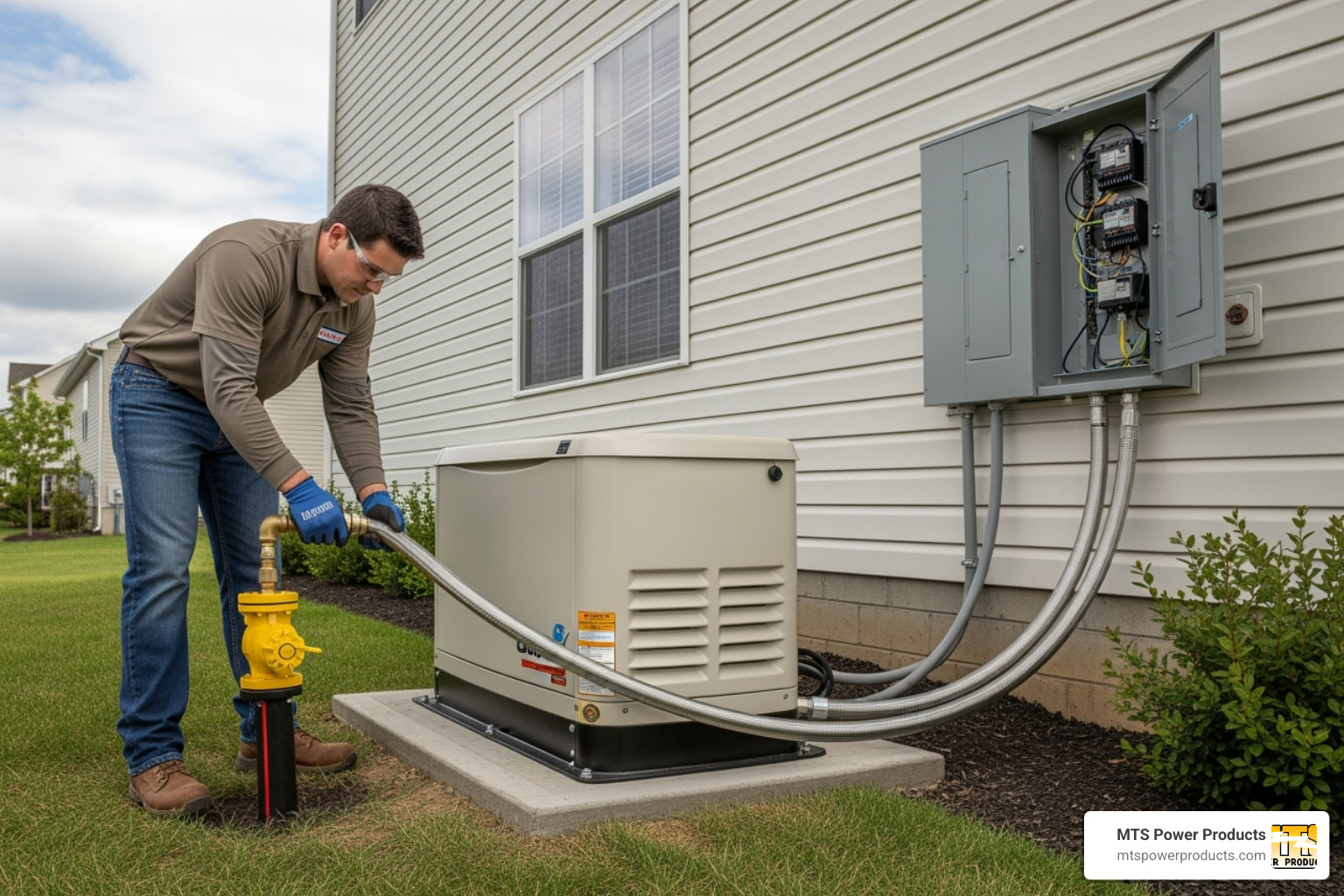
Several critical components make up your installation costs, and understanding each helps you budget accurately.
The Automatic Transfer Switch (ATS) is your generator’s brain. It detects when the power goes out and seamlessly switches your home from grid power to generator power, then back again when utility power returns. Installing an ATS typically costs $600 to $2,500, including labor. Most electricians charge $65 to $100 per hour for this specialized work. The good news is that most natural gas generators rated 5 kW and higher come with a transfer switch included.
Gas line piping connects your generator to your home’s natural gas supply. If you already have natural gas service, extending the line usually costs $300 to $1,000. However, if you need a completely new gas line from the street, expect to pay $2,000 or more. Professional installers typically estimate piping costs at $10 to $20 per kW of generator capacity, or $12 to $25 per foot of gas line needed.
Your generator needs a solid foundation, which means pouring a concrete pad. This stable, level surface typically costs $150 to $400, or about $50 to $75 per square foot. While it might seem like a small detail, a proper foundation prevents vibration issues and extends your generator’s lifespan.
Electrical wiring connects everything together, running from your generator to the transfer switch and electrical panel. This often involves trenching and careful routing, with costs around $6 to $8 per foot of wiring needed.
Don’t forget about permits. Nearly every municipality requires permits for generator installations to ensure safety compliance. Permit costs range from $80 to $450, depending on your location. Some areas charge $400 or more, but this investment protects you and ensures your installation meets all local codes.
For larger generators over 20kW or complex installations requiring long gas line runs, total installation costs can reach $5,000 to $12,000. Commercial installations often follow a rule of thumb of about $1,000 per kW installed.
Understanding permit requirements and costs by state helps you plan accordingly. At MTS Power Products, we handle comprehensive Natural Gas Generator Installation services, ensuring your system meets all safety requirements and operates flawlessly for years to come.
Once your generator is up and running, you’ll want to budget for the ongoing natural gas generator cost of keeping it operational. Think of it like owning a reliable car – there are fuel costs when you drive it and maintenance expenses to keep it running smoothly.
The beauty of natural gas generators lies in their long-term economics. With proper care, these workhorses can serve your family or business faithfully for 20 to 30 years. That’s a lot of power outages they’ll help you weather!
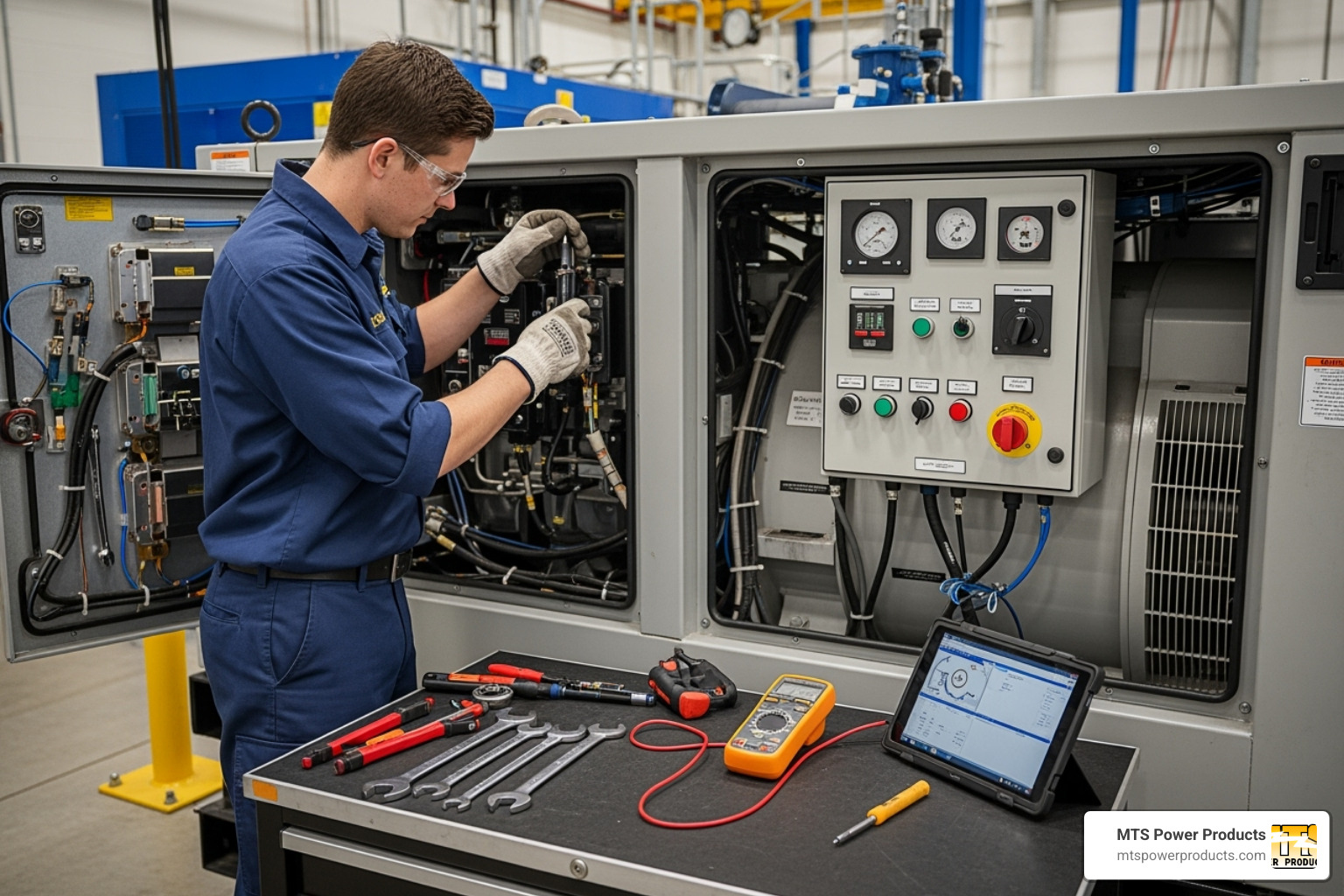
Here’s where natural gas generators really shine. Unlike diesel or propane units that require fuel deliveries, your natural gas generator taps directly into the same pipeline that feeds your home’s furnace or stove. No running out of fuel at the worst possible moment!
Fuel consumption varies by generator size and load. Natural gas usage is measured in cubic feet per hour (CFH), and the math is pretty straightforward once you know your local gas rates.
A 7-kilowatt generator typically burns about 118 cubic feet per hour, costing roughly $0.82 per hour at average natural gas prices. During a typical day-long outage, that’s only $20 to $40 – less than most families spend on takeout dinner.
Medium-sized 15-kilowatt units consume around 245 CFH, translating to about $1.71 per hour. For most homeowners, this represents excellent value when you consider the convenience and peace of mind.
Larger 20-kilowatt generators running at full capacity use approximately 289 CFH, costing about $3.63 per hour based on national averages. Even at quarter load, you’re looking at around $1.97 per hour – still very reasonable for whole-house backup power.
Most generators fall into the $0.50 to $3.00 per hour range during operation. What makes this even more appealing is that natural gas typically costs 3-4 times less per BTU than diesel fuel, making it the most economical choice for extended outages.
Even the weekly exercise cycle – that brief 10-minute test run that keeps your generator healthy – only adds about $4 to $5 per month to your gas bill. For current pricing in your area, check the U.S. Energy Information Administration (EIA) data on natural gas.
Like any hardworking machine, your natural gas generator needs regular attention to stay reliable. The good news? Maintenance costs are predictable and reasonable when spread over decades of service.
Annual maintenance typically runs $200 to $650 for residential units, though some comprehensive service plans can reach $1,000. Commercial generators require more intensive care, with maintenance contracts ranging from $500 to $2,500 annually depending on size and usage demands.
Regular maintenance keeps your investment protected. Professional technicians handle oil and filter changes every 100 to 200 hours of operation (or annually for most homeowners). Battery replacements happen every 2-3 years – a small price for reliable starting power when you need it most.
Air filters, spark plugs, and coolant all need periodic attention. Most homeowners benefit from professional inspections every 6 to 12 months to check belts, hoses, and overall system health. It’s like a physical for your generator – catching small issues before they become big problems.
Load banking is a specialized service where technicians run your generator at full capacity using artificial loads. This validates performance and prevents issues that can develop when generators only run lightly loaded. Expect to pay around $1,000 plus $1.50 per kW every few years for this service.
While natural gas generators require slightly more frequent servicing than diesel units, their convenience and unlimited fuel supply make them incredibly popular. When you factor in 20 to 30 years of reliable service, the maintenance investment pays dividends in peace of mind and uninterrupted power.
For more insights into the long-term value proposition, explore The Advantages of Buying a Natural Gas Generator for Sale.
When evaluating the total natural gas generator cost, compare it against other common fuel types like diesel and propane. While the initial purchase price can vary between fuel types, the long-term operational and maintenance costs often reveal natural gas as a highly competitive, if not superior, option for most applications.
The standby power market has undergone a significant change in recent years. What was once dominated by diesel generators has seen a remarkable shift toward natural gas systems. This change is driven by greater awareness of natural gas’s reliability, growing concerns over diesel maintenance and refueling challenges, and increasing environmental considerations.
| Metric | Natural Gas Generators | Diesel Generators | Propane Generators |
|---|---|---|---|
| Initial Cost | Competitive pricing, especially under 150 kW. Above 150 kW, can cost 60-100% more than diesel | Generally lower upfront cost for larger units | Moderate initial cost, similar to natural gas |
| Fuel Cost | $0.50-$3.00 per hour operation. Very stable pricing through utility connections | 3-4x more expensive than natural gas per BTU | Higher than natural gas, requires storage tanks |
| Maintenance | Regular service needed every 100-200 hours. Annual costs $200-$650 | Less frequent service intervals but higher complexity | Similar to natural gas maintenance requirements |
| Reliability | Unlimited fuel supply via pipeline connection. No storage concerns | Requires fuel storage and regular deliveries | Limited by tank size, requires refilling |
| Environmental Impact | Cleanest burning fossil fuel option. Lower emissions | Higher emissions, fuel storage environmental risks | Clean burning but requires transportation |
The comparison becomes even more compelling when we examine the practical differences. Diesel generators typically cost 3-4 times more to operate per hour than natural gas units. While diesel might have lower upfront costs for larger systems, the fuel expenses quickly add up. A 20 kW diesel generator running for 24 hours during an extended outage could cost $150-200 in fuel, compared to $12-72 for the same natural gas unit.
Propane generators fall somewhere in the middle cost-wise, but they come with significant storage requirements. You’ll need large propane tanks on your property, regular deliveries, and careful monitoring of fuel levels. During extended outages or natural disasters, propane deliveries might be delayed, leaving you without backup power when you need it most.
Natural gas eliminates these storage headaches entirely. As long as the utility gas lines remain intact (which they typically do during most outages), you have an unlimited fuel supply. This reliability factor alone makes the natural gas generator cost worthwhile for many homeowners and businesses.
The environmental benefits also translate to potential cost savings. Many utility companies offer special rates for natural gas generators, and some areas provide tax incentives for choosing cleaner-burning backup power options.
For most residential and small commercial applications, natural gas generators offer the best balance of initial investment, operating costs, and long-term reliability. The fuel cost savings alone often justify any higher upfront expense within the first few years of ownership.
For more detailed information about the advantages of natural gas systems, explore Gas or Natural Gas Generators for Sale: Pros and Cons.